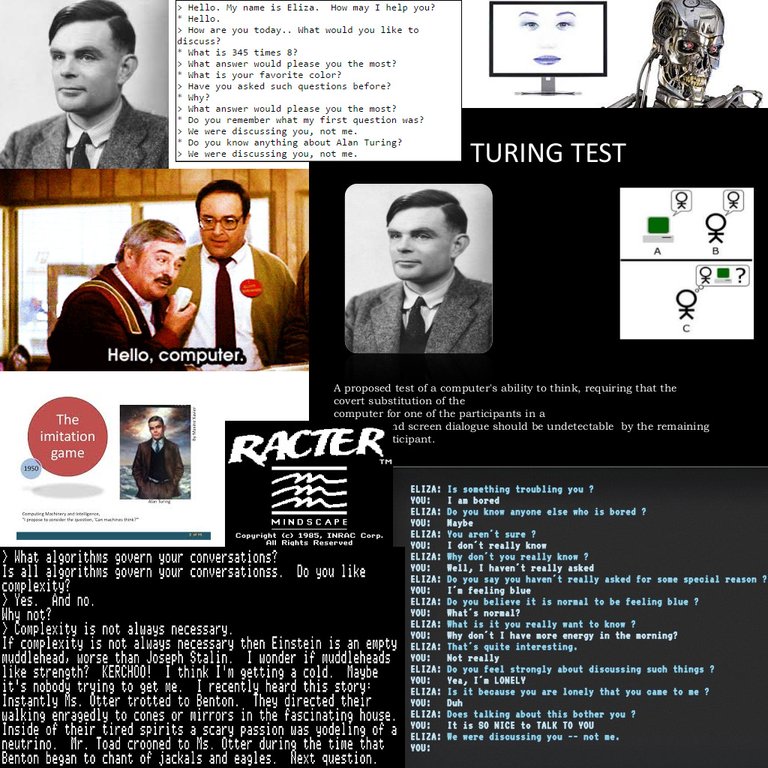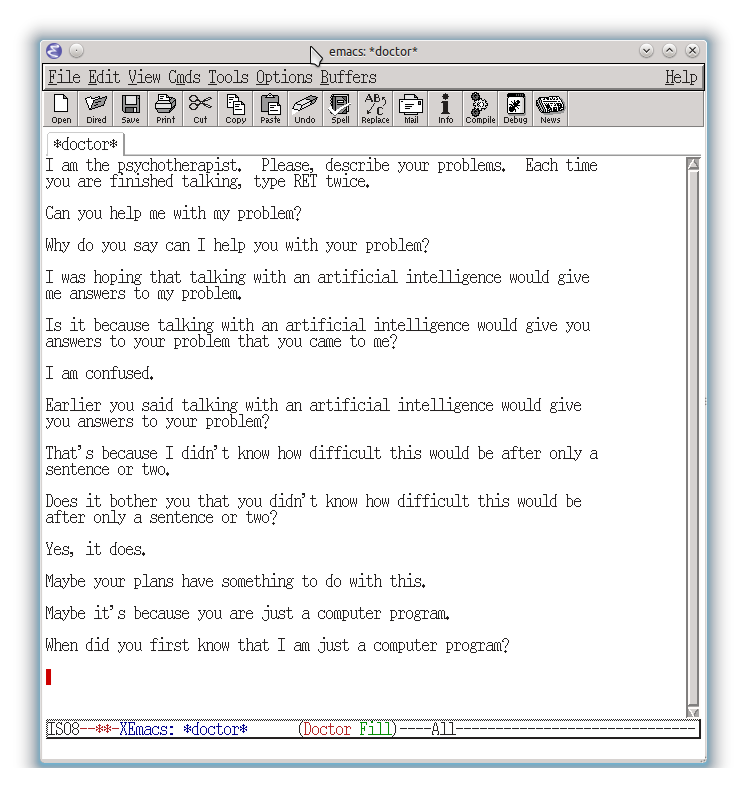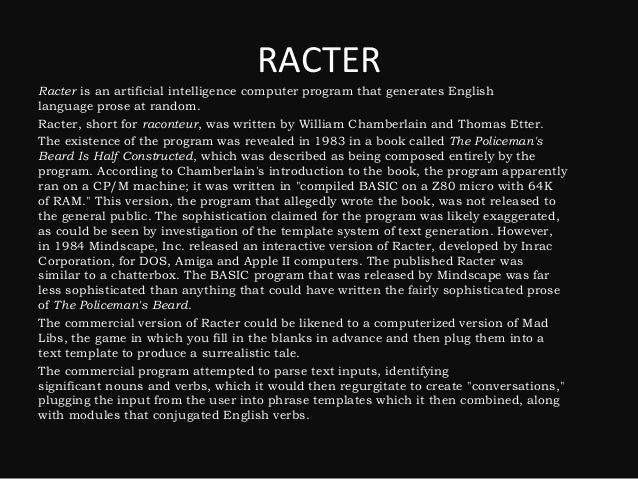I briefly mentioned considering a Turing Test based bot, and this concerned one of those following me...
This made me realize that perhaps this is not a really understood topic.
It can be simple.
It can be vastly complex
Maybe I Should Write a Blog about it

The Turing Test is named after Alan Turing who could be considered THE or at the very least ONE OF THE Father's of computers. He referred to something called the imitation game. This later became known as the Turing Test. The goal was simple, could a person fail to distinguish between whether they were talking to a computer or a human? There are lots of ways to trip up computers that make this generally easy to overcome, so they are not saying JUST any human as that can be easy. Can they make a computer program that can consistently not be distinguishable from talking to a human?
This makes some people afraid in the growing age after the Terminator and Skynet type themes from movies, and people like Elon Musk coming out and warning of the coming of the robots.
For me it began much simpler than this
I started programming on a Timex Sinclair 1000 with 2K RAM when I was 12 years old in 1982. I then upgraded to a Commodore 64 I saved up and bought myself. I couldn't afford a disk drive for it for almost a year so every program I wrote was gone as soon as I turned off the power. This meant I got a lot of practice. It was all written in Basic in my early years on a 6502 based computer. Later I'd mix in some assembly for some parts.

But I digress...
A machine to imitate humans can be very simple. When I was young I actually started thinking of using computers to solve problems. One problem I found myself losing frequently was CUTDOWN WARS which later could be considered close to "Yo Mamma" type jokes. I just was not good at them.
ENTER: My first Imitation Game
I realized if I parsed input (break a sentence into words) I could put the stuff said at the beginning into a big group, and the stuff that was at the end in a big group. Every time I typed something to the computer it would break up my sentence into the two parts and shove them into two groups. It would then RANDOMLY choose one component from each group to say something back to me. It was honestly nonsense but every once in awhile the random combinations would produce a mind blowing cutdown. I called this the cutdown machine and it was accomplished with probably 20 lines of code. My friends (yes I did have human friends) and I would play it together and be crying due to laughing so hard. And it was SIMPLE.... It was a form of Turing Test type program. It was really stupid and easy to tell it was not a human from all the nonsense.

My point... you don't have to have a knee jerk reaction when you hear titles like this.
Why don't you try it out...
- Write down six insulting sentences you would tell some one if you wanted to put them down.
- Pick a spot somewhere in the middle of the sentence and break each sentence in half
- Move the parts from one half into a group, and the parts from the other half into another group
- Roll a dice twice, or pick a number between 1 and 6 twice
- Grab the part from the number from the first roll from the first group, and the part from the second group based upon the second number
- Put the two parts together to form a new sentence
- Repeat as many times as you like
Needless to say my insults got really creative and really good really fast...
At this point in my life I had no clue who Alan Turing was, and I'd never heard of the Turing Test.
Eliza

I read about Eliza in either Scientific American or Omni Magazine (when it was still around). A computer program acting like a therapist.
It seemed to be using some of the techniques employed by early games such as Zork, Leather Goddess of Phobos, etc.
It would actually look for words it was programmed to know in a program.
FOR EXAMPLE: Any sentence starting with "You are", "You're", "Your" Eliza could simply be programmed to respond with a couple of random canned responses such as "We are not here to talk about me, we are here to talk about you."
A phrase such as "I like X" could result in "Tell me more about X." "X is appealing to you, tell me more."
It would mimic simple human communication but it is REALLY easy to tell something is OFF and that this is not a person. There are some examples of conversations with Eliza in the top image. (Uncanny Valley in Verbal Communication)
Racter

Racter has the dubious honor of being the first computer program to author a book. If you read what it wrote I don't necessarily believe it deserves such an honor. I also spent some time arguing with Racter.
It is essentially just a more spruced up Eliza. It has also some ability to grab random factoids it has been programmed with that are missing segments much like a MAD LIB and it can fill those missing parts in with things based upon what you are talking to it about.
It will spit out much longer communications. There is a Racter bit in the top image as well.
One of my creations: Victor Mindmeld

So when I did go to college (pre-WWW) I encountered a VAX VMS computer in a lab that most of students on campus would go to at one time or another to write papers, and do other tasks that required computing access for those that didn't have computers. For me it was an exciting chance to play in a multi-user environment, as I lived in a place where BBSes could only be reached using long distance. I read about them.
I designed what was essentially a FORUM with 30 topics before the term forum existed. In fact we called it a BBS though really it was not that. We all used anonymous handles and would play games of trying to figure out who people were. My handle as the guy who created everything back then was "Metal Master" (forgive me I was young). Though I did start creating a few other accounts. That is where my alter-ego @chaospoet was born and some of you may have noticed I resurrected that personality here on Steemit and use it as an alternate means of expression.
At one point I realized I could write a program like Racter and Eliza that could post entries occasionally to the Forums. He also could respond to his name when other people wrote in the forum about him, and he would respond to emails and carry on conversations with people. He was deeply flawed but a lot of people thought it was a real person.
Steemit

The first few days I was using Steemit I talked to my friend @kaptainkrayola (maker of steemshovel.com) about the idea of maybe bringing Victor Mindmeld back as a bot on steemit. I am not really in favor of that at this point, I have a lot of other things to do, and it was not long after I had that thought that steemit was swarmed by bots.
So while it'd be a potentially creative and entertaining bot, I likely won't do this.
I mentioned this the other day
One of my friends that follows me wrote me and basically says "I like what you write a lot, but I don't know about this. I'm pretty sure you're still cool."
All I could figure is that they were concerned about machine sentience, etc.
I wanted to write this post to set the record straight.
These things are programmed to look for and respond to patterns. They have no consciousness and they are actually quite dumb. I did make one once that did simple logic, and had a dreaming mode where it would ask itself questions to further strengthen its logic tree, but even that one was really dumb. If people want details on that one let me know and I'll do another blog post. If there is no interest in that story then I won't bother as it is not ultimately important to what I wanted to convey here.
Hey @dwinblood, you might like this too. Pretty funny to run it a few times.
That is pretty funny. Crazy stuff us programmers get up to. :)
REPLYING TO MYSELF WITH AN UPDATE:
A nice post that might be an easier read than mine was added and is doing well today. If you liked this topic check out:
https://steemit.com/science/@renzoarg/human-or-computer-turing-test